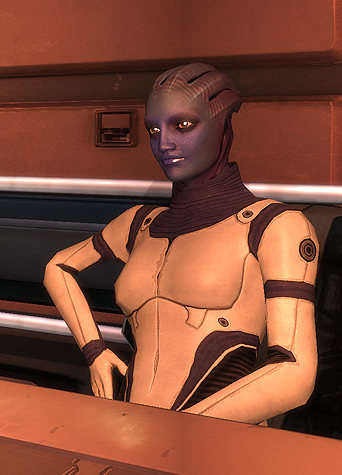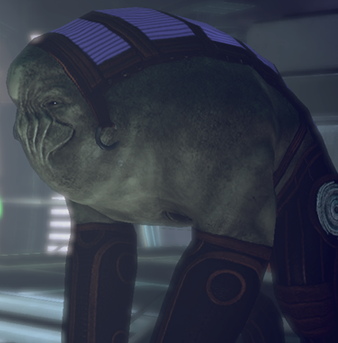Unexpected Consequences of Plot
2010, March 22nd 9:00 PMLast night I found myself unable to stop thinking about Mass Effect 2. Not about to the gameplay, or the plotline. I just couldn't get my mind off the bizarre social effects that the universe implies.
For a bit of backstory, the critical bits of plot go like this. Humans join a galactic civilization with a bunch of alien species. One species is a bunch of blue women who sleep with other races.
Alright. First off, this is obviously only "the critical bits of plot" for the purposes of this particular blog post. I'm not arguing that. Second, the Asari aren't technically women, it's a single-sex race, but, come on:

That's female.
Now, it's reasonably clear in the game that Asari are bisexual. But humans, as far as we know, generally aren't. Humans tend to be heterosexual. I'm pulling this claim out of nowhere but I feel reasonably confident in it. So take the human race as it stands today, and then, out of goddamn nowhere, introduce an entire new race full of reasonably attractive and sexually compatible females.
What the hell does this do to gender balance? People are worried about China's gender balance, which is leaning 55% male. Even assuming the Asari population is no larger than Earth's, this leaves us with a stunning 75% female ratio. And according to the chronology, the Asari were colonizing space before the rise of the Persian Empire! Human growth rate is around 1% right now. Let's assume the Asari have a growth rate a mere tenth of that – 2500 years of growth leaves the Asari with more than twelve times the population of Earth.
(If you assume they actually have a 1% growth rate, then each male human could have literally an entire planet full of Asari women while still occupying less than 10% of the entire Asari population. Though I admit "occupy", despite the somewhat misogynistic double entendre, isn't really the right word when there are twice as many women on your planet as you'll have heartbeats in your life.)
"Oho," I hear you saying, "but why would the Asari mate with humans?" Well as of the time of Mass Effect, an Asari mating inside their species is considered a mark of shame. So basically you have a civilization of a hundred billion females who want nothing more than to breed with aliens. Now, in their defense, they're not picky about gender – but humans are, and I don't see that changing without some truly unbelievable cultural shifts. Not the kind of thing that would happen in a mere five hundred years, I feel.
"But wait! What about other species?" Yeah, sure, the Asari mate with other species too. No arguments there. It happens. There's the species of giant armor-plated killing machines that weigh a literal ton each and are infertile. There's the species of lizard men whose food is poison to most other races. There's the species of . . . well, we don't know what they are exactly under the biological containment suit, besides "humanoid", but we do know that even opening the suit for a few seconds is incredibly dangerous for them. And then there's the species that doesn't consider it "incredibly dangerous" but rather "instantly fatal".
And there's the floating luminescent jellyfish.

If you were an alien, and I showed you pictures of all the Mass Effect 2 races, and asked which were most likely to be sexually compatible, you'd pick the Drell, the Asari, and the Humans. And the Drell are nearly extinct. And they don't travel much.
Bioware, I love you guys. I really do. But did you stop to think for a second about the social consequences of this?

